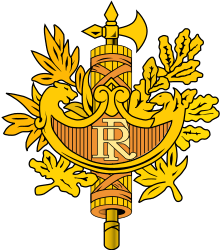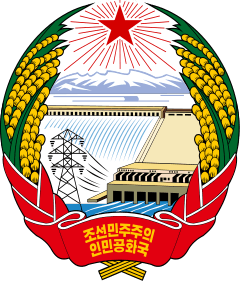France–North Korea relations
Relations between France and North Korea do not exist, as the two nations do not have formal diplomatic relations with one another. France is the only European Union member not to recognise North Korea.[1]
 | |
France |
North Korea |
|---|---|
According to a 2013 BBC World Service Poll, only 19% of French people view North Korea's influence positively, with 81% expressing a negative view.[2]
History
Relations between France and North Korea, in the sense of relations between sovereign states, are officially non-existent. France is the only European Union member not to recognise North Korea,[1] while both Estonia and France are the only two European Union members that have not established formal diplomatic relations with the state.[3] This means, de jure, that France considers the Republic of Korea to have sole sovereignty over Korea.
France's official position is that it will consider establishing diplomatic relations with the DPRK if and when the latter abandons its nuclear weapons programme and improves its human rights record.[4]
President François Mitterrand who toured North Korea in 1981 promised recognition to North Korea before he was elected.
In late 2009, French president Nicolas Sarkozy appointed Socialist politician Jack Lang his special envoy to North Korea, following a similar assignment earlier in the year to Cuba. Lang traveled to Pyongyang on November 9 for a self-described "listening mission" aimed at exploring bilateral ties and discussing the North Korean nuclear program, among other things. Lang briefed American officials including Deputy Secretary of State James Steinberg and special envoy Sung Kim, as well as ambassadors of countries involved such as Russia, before the assignment was publicly announced. Some critics questioned Lang's qualifications, but Lang said he would be driven by his "intuition" that change was afoot in North Korea.[5]
On December 18, 2009, North Korea consented to the French government's offer to establish a French Cooperation and Cultural Action Office as a first step for normalizing the relations between the two countries. On October 2011 it was reported by the French foreign ministry that France was on the verge of opening an office in North Korea to develop cultural ties and to represent French aid groups working in North Korea. The office was to be headed by French diplomat Olivier Vaysset, "given the needs that have been identified in the cultural and humanitarian domains," ministry spokesman Bernard Valero said.[6] The office was opened in Pyongyang on 10 October, and focuses on cultural and humanitarian issues. The French government has made clear that the opening of the office does not imply a formal diplomatic recognition of North Korea by France; such recognition remains conditional upon "an improvement on the nuclear issue, inter-Korean relations, and the humanitarian and human rights situation".[7]
Economic relations
Economic relations are also limited. In 2005, French imports from North Korea were worth €24 million, and French exports to North Korea €6 million.[8]
In 2005, there were officially 54 North Koreans living in France.[9] The only French residents in North Korea are humanitarian workers.[10] France provides humanitarian aid to the DPRK, and allows a small number of North Korean students to study in France every year.[11] It primarily provides administrative training, and training in the field of architecture.[7]
The North Korean film The Schoolgirl's Diary was released in France in 2007.
See also
- Foreign relations of France
- Foreign relations of North Korea
- French-South Korean relations
References
- Commission de la défense nationale et des forces armées (30 March 2010). "Audition de M. Jack Lang, envoyé spécial du Président de la République pour la Corée du Nord" (in French). Archived from the original on 17 February 2012. Retrieved 28 June 2018.
- 2013 World Service Poll BBC
- "DPRK Diplomatic Relations", National Committee on North Korea
- questions.assemblee-nationale
- Charlton, Angela (3 November 2009). "France wades into bog of North Korean diplomacy". Associated Press.
- Associated Press, September 29, 2011
- "La France et la Corée du Nord", French Ministry of Foreign Affairs, December 2012
- "Economie française: Commerce extérieur Archived 2008-04-04 at the Wayback Machine, Quid
- "Etrangers en France" Archived 2008-05-05 at the Wayback Machine, Quid
- "Première Urgence". Archived from the original on 2008-04-22. Retrieved 2008-05-04.
- Official website of the French National Assembly

